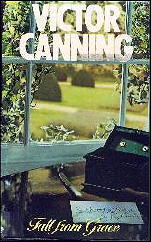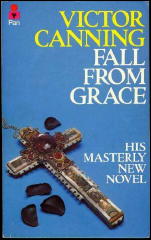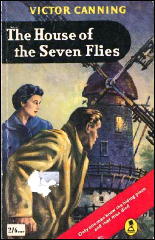Wed 15 Jul 2009
A 1001 MIDNIGHTS review: VICTOR CANNING – A Fall from Grace.
Posted by Steve under 1001 Midnights , Reviews1 Comment
by John Lutz:
VICTOR CANNING – A Fall from Grace. Wm. Heinemann, UK, hardcover, 1980; Pan, UK, pb, 1982. William Morrow, US, hardcover, 1981; reprint hardcover: Detective Book Club, 3-in-1 edition, June 1981.

Beginning with Polycarp’s Progress in 1935, Victor Canning has written over fifty novels. After World War II, he turned his efforts to espionage fiction, a genre at which he is now acknowledged to be one of the best practitioners.
Fall from Grace, however, is anything but an international thriller. Halfway through this psychological mystery, Canning’s main character, private investigator James Helder, is asked how a calm, good-hearted man such as himself got into his somewhat unsavory line of work.
Part of Helder’ s explanation is that he feels himself to be “a sort of gray shape living a gray, humdrum life like so many people. So, to escape from all that, I mix in other and more unorthodox people’s lives to add a little crude color to my own.”
The unorthodox person Helder is trailing here is the totally amoral John Corbin, about whom Helder observes, “The John Corbins of this world felt compelled to make the occasional obligation to the gods of chance. A little not-too-expensive kindness here, a rare good deed to assuage self-disgust, even at times an isolated self-sacrifice to bring them close to the shriving of some sin.”

That really is all this novel is about, but it is enough. Canning gives us an engrossing, incisive study of the world’s Corbins, the selfish and impulsive people who charm those close to them and sometimes even themselves, predators with engaging smiles and talent for deception.
This John Corbin lands a job writing the history of the gardens of Illaton Manor, long tended by the family of Corbin’s employer, the bishop of Testerburgh. Included in the job are a cabin, extensive research facilities, and circumstances which make it easy to seduce beautiful coworker Rachel Harrison.
Corbin takes advantage of all these conveniences, for a while even convincing himself that he genuinely loves Rachel. But an unexpected opportunity for profitable mischief proves that Corbin’s new leaf is only ego-supported self-delusion, a strained hiatus from reality. He enthusiastically reverts to type.

This is a meticulously written, revealing glimpse into the mind of a man who is the serpent in his own Garden of Eden.
Especially good among Canning’s early novels are The Chasm (1947) and The House of the Seven Flies (1952). Other noteworthy titles among his later works include Firecrest (1972), The Rainbird Pattern (1973), which was the basis for Alfred Hitchcock’s last film, Family Plot, and Birds of a Feather (1985). Also excellent is a collection of four suspense novelettes, Oasis Nine (1958).
———
Reprinted with permission from 1001 Midnights, edited by Bill Pronzini & Marcia Muller and published by The Battered Silicon Dispatch Box, 2007. Copyright © 1986, 2007 by the Pronzini-Muller Family Trust.
[UPDATE] 07-16-09. Jamie Sturgeon has just pointed out the existence of a website devoted to Victor Canning, including of course a detailed bibliography. It’s at http://www.victorcanning.com/, and it is a work of art, to say the least. In terms of the bibliography, not only are covers of each edition of every book shown, but photos of places mentioned in each of the books are often included as well.
July 16th, 2009 at 10:58 pm
The only thing I would add to this would be to point out that though Canning’s reputation may be as a spy writer, he was primarily an adventure novelist during the early part of his thriller writing career (only Panther’s Moon, Limbo Line, and Venetian Bird are Cold War novels from this period).
That said, many of the adventure novels have some aspect of international intrigue (Castle Minerva, A Handful of Silver, House of Seven Flies …)
It wasn’t until later that he turned to spies, most importantly in what is known as the Birdcage trilogy, and even then many books such as Queen’s Pawn and Rainbird Pattern were suspense novels rather than international intrigue, and others adventure novels (The Great Affair) and even near science fiction (The Finger of Saturn). His later books are mix of crime, suspense, and spy novels, and his historical Arthurian trilogy.